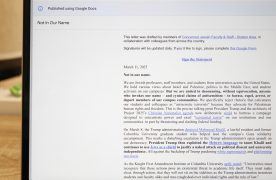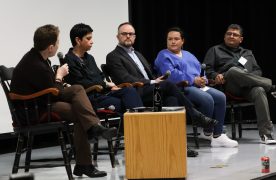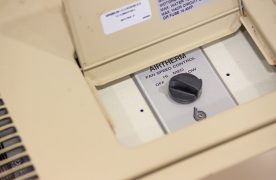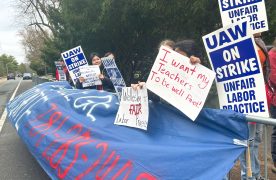Community members near the Boston University biolab submitted their final comments to the National Institutes of Health last week, rounding up a battle over clearance for biosafety Levels 3 and 4 in the National Emerging Infectious Diseases Laboratories.
The NIH will consider community input to determine if the biolab will operate at these levels, which include research on pathogens such as Ebola.
The NIH’s final supplementary risk assessment, released in July, follows two years of contested reports and an approval process that has taken more than six years.
“The process has taken this amount of time due to the depth and scope of the analysis,” said Nalini Padmanabhan, a spokesperson at the National Institute of Allergy and Infectious Diseases within the NIH, in an email.
Padmanabhan said the biolab is still not fully operational because of extensive input solicited from independent experts and the efforts of the NIH to gather input from the Boston community.
The NIH would not comment on a date for when they would reach their ultimate decision.
The final risk assessment shows “that the risk of infections resulting from accidents or malevolent acts at the NEIDL are generally very low to only remotely possible,” according to the reader’s guide to the final assessment.
Jeff Mooney, who lives in Marshfield but works in the South End, said he feels nervous to work around the lab.
But, he said, the research is essential, and he trusts government oversight to ensure the safety of the lab.
“It’s a professional facility,” Mooney said. “They wouldn’t be allowed to do it by the government if they didn’t do it properly.”
Nani Morgan, who lives in the South End and works at Tufts Medical Center, said one of Tuft’s labs had a similar problem when the school announced it would be studying tuberculosis at its South End facility.
Morgan said she could understand why Bostonians would be upset by the BU biolab’s research.
While she does not “have a comprehensive idea of the risks involved,” she said, “generally the benefits outweigh the risks.”
Biolab officials said that similar labs have operated safely.
“I believe the NIH report confirms what we have been telling the community — that these agents and the type of research can be conducted safely,” said Ara Tahmassian, vice president of BU’s Research Compliance, in an email.
There are about 30 Level-3 labs in Massachusetts, including two on BU’s campus, that have operated safely for years, he said.
“We fully expect that once the regulatory and judicial process is over, the NEIDL will operate at all biosafety levels,” Tahmassian said.
Tahmassian said the Boston Public Health Commission requires Level-4 laboratories to obtain a permit before opening and must approve each project.
“This requirement actually makes Boston one of the strictest, if not the most strict, jurisdiction for conducting BSL-3 and BSL-4 research,” Tahmassian said.
Ellen Berlin, the BU spokeswoman for the NEIDL, said in an email that BU remains hopeful that all necessary approvals will be made for the biolab to study Level-4 viruses.
But as the NIH’s decision nears, a strong community voice against the biolab persists.
Liana Poston, the director of legislative affairs for Boston City Councilor Tito Jackson, of the South End, said Jackson felt the low-risk rating of the final risk assessment did not quell all his concerns.
“Councilor Jackson welcomes another risk assessment,” Poston said in an email. “[One] that adequately addresses long-standing concerns about environmental justice and virus behavior in densely populated spaces.”
Jackson has met with Safety Net, the anti-biolab Roxbury community group, and has written letters to state officials opposing the BU biolab, Poston said.
“We don’t trust BU, period,” said Klare Allen, coordinator for the citywide resident group Stop the Bio-Terror Lab. “This is their fourth risk assessment, I believe. We need a credible risk assessment.”
The National Research Council, the independent science panel that studied a 2011 risk assessment, noted several areas that needed safety improvements, but stated the biolab had improved its report of potential risks.
“The work they had done was sound scientific work, the scenarios they developed were credible and the analyses they presented were also sound and credible,” said John Ahearne, a former chairman of the U.S. Nuclear Regulatory Commission who chaired the 11-member panel of scientists.
But Allen said previous risk assessments were invalid because they did not usually include third-party review.
Only the NIH has reviewed these assessments, she said.
The NIH gave the biolab a $128 million grant.
“I think that if BU came out with a credible risk assessment it would show that there is more than one person that would be infected, exposed and die from it,” Allen said, “and I think that one life is too many for science.”
This is an account occasionally used by the Daily Free Press editors to post archived posts from previous iterations of the site or otherwise for special circumstance publications. See authorship info on the byline at the top of the page.












